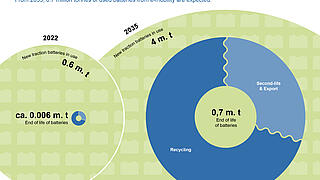Whether they are destined for use in e-mobility, industry or renewable energy storage, batteries are a key focus of interest when resource and recycling issues arise – not least because they contain substantial quantities of precious metals. Depending on type, an e-vehicle battery can contain as much as 15 kg of cobalt and 4-10 kg of lithium. In its research, the Oeko-Institut looks at the entire battery life cycle: from resource extraction to battery production, end-of-life battery collection, recycling and second-life applications, and explores how sustainability can be integrated at every stage.
The European Union’s new Battery Regulation aims to raise the targets for the total amount of recycled mass while setting specific recovery targets for nickel, cobalt, copper and lithium. It will also include provisions on the use of recycled content in new batteries. The Oeko-Institut supports the process to improve the sustainability of batteries and battery material flows by sharing its expertise and assessing technical issues, goals and policy options. In addition to exploring global resource demand issues, its work focuses on end-of-life battery collection, product responsibility and ambitious recovery targets.
![[Translate to English:] © Öko-Institut](/fileadmin/_processed_/6/4/csm_Ressourcenwende-Batterien_%C3%96ko-Institut_ff78eba0d9.jpg)










